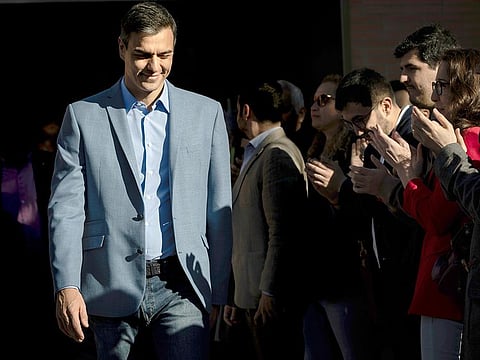Playing the numbers’ game in Spain
Sanchez won’t have a coalition deal in place until after local polls at the end of May

Spain’s voters have cast ballots in their third national election in four years, and with the Socialists of Prime Minister Pedro Sanchez improving their lot in the new parliament significantly, they still remain far short of the 176 seats needed for an overall majority in the 250-seat Congress of Deputies in Madrid.
They went into the election campaign with just 84 seats, but Sanchez’s optimistic message over the Spanish economy, along with a tough-love policy over Catalan independence, saw voters give the 47-year old leader and his party 123 seats — 53 seats short of being able to form a government by themselves.
And right now, Sanchez is taking his time to weigh up his options — the rest of the Congress of Deputies is deeply fragmented. The worst-case scenario is that Spanish voters could be heading to the polls once more next year — a prospect that none other than Vox, on the far right of Spain’s political spectrum, would relish.
Before the election, Sanchez held his government together with the support of the radical left-wing party Podemos and support from moderate Basque nationalists.
For the Basques, they went into the election with five deputies, and voters in the northeast region of Spain returned one more Basque last weekend.
With those six — and presuming that they will once more back Sanchez in either a formal or confidence and supply arrangement — the Prime Minister is still looking for another 47 votes to form a majority.
Podemos? It and its allies — the party splintered in the months before the vote, and the infighting badly affected its ability to campaign effectively — came up with 42 seats.
The trouble is that part of the infighting resulted from Podemos supporting Sanchez after a vote of no confidence toppled former Prime Minister Mariano Rajoy and his conservative mainstream People’s Party in June of last year, with the party feeling that an election would have better suited it then.
Either way, if Podemos does indeed commit to a new Sanchez-led administration, the Socialist leader comes up tantalisingly short of that magic number of 176 seats — he has 171.
So, is 171 enough to be able to govern? Possibly, but it will take a lot of nerve-jangling votes anytime there’s a contentious or divisive issue — and it’s likely not enough to be able to pass a budget. It was that inability before that resulted in Sanchez having to call last weekend’s election in the first instance.
So where are those five seats?
There are two deputies from the Canaries that support independence, another from Valencia and a fourth from the Cantabria Regional Party that might get him close to the line.
There are four other more radical Basques who might be called upon — and two Catalonian separatists parties have 22 more deputies combined. Would he be bold enough to suggest a pan-Socialist-nationalist coalition?
That’s not really likely, given that Sanchez talked tough in the election campaign over the threat of Catalonian independence. That stance came in part from the surge in support for the far-right Vox, who won 24 seats, who want to abolish Spain’s regional assemblies and rule through a single parliament in Madrid instead. If Sanchez plays the Catalonian card now, he’s risking giving Vox even greater potential support down the road.
Centre-left coalition?
Or perhaps, Sanchez might indeed forsake the mathematics of a left and nationalist coalition, and shift instead to a coalition of the left and centre?
Ciudadanos — a centrist populist party — came out of Sunday’s election with 57 deputies. Such a deal would put Sanchez squarely over the finish line with a majority and four votes to spare. That’s a working majority in anybody’s books. But it’s about politics, not numbers. What he must weigh now is whether such a deal would be worthwhile, even if it means earning the ire of many grass roots party members.
So far, the noises coming out of the leadership of Ciudadanos is that it’s not interested in getting into bed with the Socialists — at least not yet. In four weeks’ time, Spanish voters will be heading to the ballot boxes once more — this time to elect local government councils and the pick Members of the European Parliament to sit in Strasbourg as well.
For now, Ciudadanos says it is focusing on those upcoming elections rather than on exploring common ground for a coalition government.
The reality is that even though the results from the general election are fully known, the horse-trading is only beginning — and it won’t be concluded until those local elections are done and dusted — there likely won’t be any deal in place until early June.


